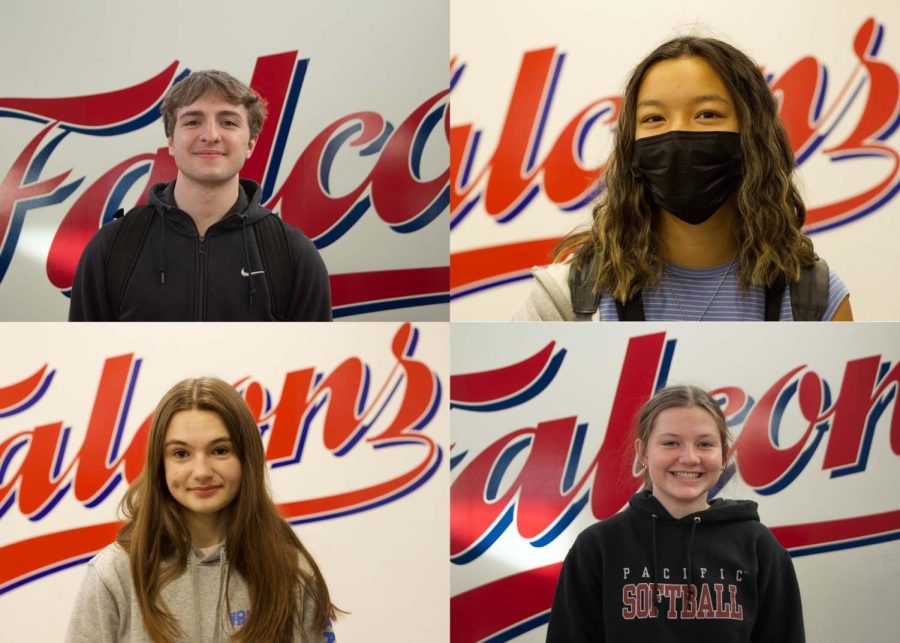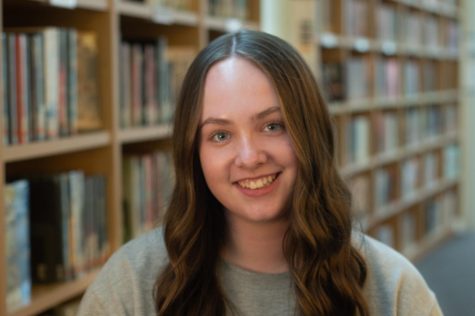“Everyone Experiences It Differently”: Student Athletes Share Their Experiences With Concussions
The Falconer asked four student athletes to share their experiences with concussions.
January 12, 2022
A risk of participating in any sport or physical activity is injury. Concussions can be very serious injuries due to the complexity of the brain, which also means the recovery and experiences of athletes look different. At La Salle many student athletes have experienced concussions, and to better understand their experience, The Falconer spoke with four athletes.
According to the Mayo Clinic, “a concussion is a traumatic brain injury that affects your brain function. Effects are usually temporary but can include headaches and problems with concentration, memory, balance and coordination.”
There are many different symptoms an individual can experience after sustaining a head injury that are grouped into different categories: remembering and thinking, physical, emotional, and sleep disturbance. For example, some of the most common symptoms under these categories are confusion, pressure in the head, blurred vision, and light and noise sensitivity.
Of all athletes who participate in contact sports each year, on average 10% of them suffer from a concussion. Unfortunately, many cases on top of that 10% are not diagnosed or detected.
When an athlete suffers from a collision or blow to the head, an evaluation by a medical professional or athletic trainer is necessary. When an athlete sustains a hit, only a medical professional can determine if they have a concussion. If they are not informed of a possible injury, they cannot help.
For most athletes, doctors may perform tests like neurological exams, cognitive testing, and imaging.
After diagnosis, it is common for athletes to ignore the symptoms in an attempt to “tough it out” which can cause symptoms to worsen. Taking the needed time to rest and properly recover from a traumatic brain injury is crucial.
Recovery looks different for each individual, but some may need cognitive rehabilitation therapy, vision therapy, occupational therapy, and physical therapy in order to fully recover and return to normal activities.
The connection between concussions and sports must be recognized as a real health concern at all levels, for society as a whole and individual athletes, as two out of every ten high school athletes playing contact sports experiences a concussion.
Ryley Vickroy
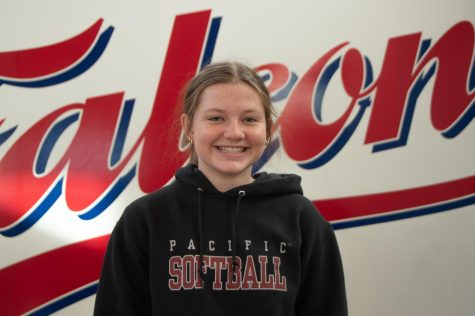
Senior Ryley Vickroy is one of many high school athletes who have suffered from multiple concussions. She has been diagnosed with three major concussions, but could have possibly suffered more during her time playing soccer and softball.
Vickroy’s last concussion was during a soccer game when she went up for a header and collided with another player, but ignored the hit and continued to play through it, “and then I don’t remember anything after that,” she said.
Her memory still remains unclear about what happened and the events that took place following the injury, and as she continued to play in a softball game over the following days she remembers hitting the ball and attempting to run to first base, but then “losing all control of my limbs,” she said.
After this, “I just felt foggy, I didn’t know where I was, I didn’t know who I was,” Vickroy said.
After finally realizing something was wrong, Vickroy first went to the emergency room and received a computed tomography (CAT) scan and then saw a range of specialists who gave her “tips on how to recover faster” as well as “doctors telling me what sports I should not play, which was soccer,” she said.
Getting to that point was difficult because she went through a couple of doctors in the process, and “some of them didn’t really understand the severity” of her symptoms and experience, Vickroy said. Her personal doctor really understood and helped her connect with another professional who also understood and could provide the help she needed, Vickroy said.
The process of recovery was frustrating because she knew it would take her out of normal activities for a long time. “All I could do was just rest and stay in my room in a dark quiet space,” Vickroy said.
She went to physical therapy as part of her recovery in order to physically help her body and mentally help her brain return to normal functioning, “because it messed up my mental state of mind,” she said.
Vickroy had experienced two previous concussions that lasted about a month, but for her third, it was two to three months before she “was able to get back up and going and start doing normal activities,” she said.
During those months, Vickroy was bored and struggled to find things to do that kept her mind off her injury.
“I realized who was actually there for me through it all and it actually made me connect better with some of my closest friends now, like from all their support,” Vickroy said.
Vickroy was away from school for a month, and “then when I went back, it was still hard to adjust and I had a lot of headaches, so I couldn’t do much of it,” she said.
In her experience, some teachers were understanding while others “just didn’t really get it and didn’t help me at all,” Vickroy said.
Vickroy was not told that her symptoms would last “for a very long time,” she said. “I still have struggles today with headaches, lighting, sound, and all that, or focusing too hard on something for a long time. I just didn’t think that it would affect me this long,” she said.
For Vickroy, often when “focusing at school it starts headaches and I have to try to work through them,” she said.
Vickroy cannot go to places such as arcades, because the stimulation and noise trigger symptoms as a result of her multiple concussions.
Vickroy’s advice for people experiencing concussions is “to listen to your body and to sit out when you are in pain, and to take the time you need because your head is the most important thing and you’ll need it for the rest of your life,” she said.
Vickroy points out how “everyone experiences it differently,” and some can take harder hits than others but it is important to “really support [people] when they’re going through [a concussion] because they are struggling,” she said.
Katelyn Yarno Bakke

(Fia Cooper)
Senior Katelyn Yarno Bakke has also experienced multiple concussions while playing volleyball in high school.
Yarno Bakke’s first concussion occurred after she was elbowed in the temple while playing in a volleyball tournament.
“I thought I was tired, I didn’t know what was going on,” Yarno Bakke said, but the next day at school, “I almost started crying…the lights were too much.”
Yarno Bakke talked to the previous school athletic trainer and they recommended she see a sports medicine doctor in order to receive the diagnosis and receive help she needed.
During recovery away from school, “there’s nothing to do,” Yarno Bakke said. “You want to hang out with people and talk to people but you can’t.”
There were a lot of daily decisions that required “self-control,” she said. For example, Yarno Bakke printed out all of her homework to ease her symptoms.
“The first few weeks [were] really tough, especially with coming back to school,” Yarno Bakke said. “I was doing half days and kind of on and off and then I started coming full days and I couldn’t handle the cafeteria.”
Yarno Bakke’s second concussion occurred after the COVID-19 pandemic began and students were at home in digital learning for school.
This time around, “it was a lot harder because I wasn’t upfront with my mom about it at first,” she said. “I was like ‘oh I’m fine,’ like I kinda played it off cool.
With fully online school, it was more difficult to do work, and “I felt really behind and then obviously you’re not on your phone as much, like you can’t communicate with people,” Yarno Bakke said.
During this time, Yarno Bakke felt alone and “completely numb, because it was during [quarantine] so I couldn’t go anywhere anyway and so I was in my house,” she said. “It caused a lot of anxiety to go places.”
While most of her symptoms related to her concussions have improved, “it still bothers me to be on my phone a lot,” she said. Yarno Bakke often uses the tone-change options on iPhones and iPads that can create a yellow tone to the screen, or prints her schoolwork out. Yarno Bakke also experiences difficulties taking tests at school, so she covers up sections she is not working on to focus on one portion at a time.
In Yarno Bakke’s experience, it is important to recognize concussions because they “will affect you for a long time,” she said.
Yarno Bakke’s advice to anyone who suffers a concussion is to “be honest with your parents and your doctors,” she said. “That’s probably the biggest thing, and [also] be honest with yourself.”
She wants everyone to remember, “it’s OK to take time and you’re not going to heal at the same pace as everyone else,” Yarno Bakke said.
Peter Fengler-Johnson
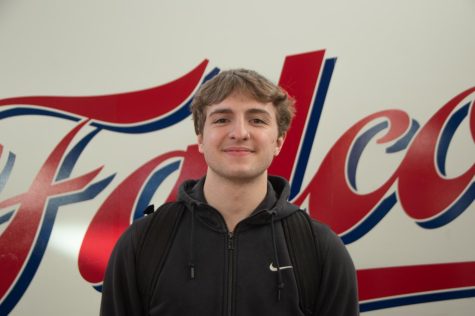
(Lukas Werner)
As a football player, senior Peter Fengler-Johnson has been diagnosed with three concussions. Before his last concussion, he remembers being “pile dragged by a really big guy and was toppled to the ground,” he said. “I remember looking up and being like ‘oh, the sky’s funny, and then kept playing the whole game.”
Afterward, Fengler-Johnson took the concussion baseline test called ImPACT, which provided him with information about his cognitive score from his baseline test taken prior to the season.
With this information, he “was really annoyed but sad, because then I couldn’t play football and I had to wait and do all the steps to get better,” Fengler-Johnson said.
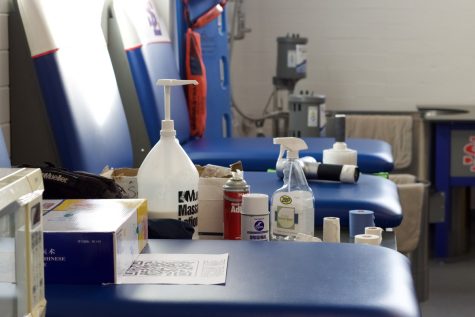
(Fia Cooper)
During the days following the injury, he let his eyes rest and did not participate in any activities because headaches were “the biggest thing for me,” he said.
To get back to playing, he did activities during the two and a half to three-week recovery. Fengler-Johnson relied on biking and running while the team practiced.
During this time, Fengler-Johnson did not feel left out during football because, “I’d still be pretty involved helping on the sideline and I’d still have a lot of fun with the team doing that stuff,” he said.
School, on the other hand, was different because he felt like he would get behind on classwork and reading since it was on Zoom. “I wasn’t really technically allowed to look at a computer screen, but I looked at it for as long as I could before I had to stop,” Fengler-Johnson said.
At school, Fengler-Johnson was told to print out work to do on paper rather than on his iPad but either way,“it was hard for me to focus anyways cognitively,” he said which made any work challenging.
Another issue Fengler-Johnson experienced during his recovery was strong mood swings. “I’d get really angry fast, or I’d get really sad fast,” he said, “which was unexpected.”
As a result of his experience, Fengler-Johnson advises anyone with a concussion to communicate with your teachers, stay in contact with your athletic trainer, and “be easy on yourself,” he said.
Eva McCaffrey
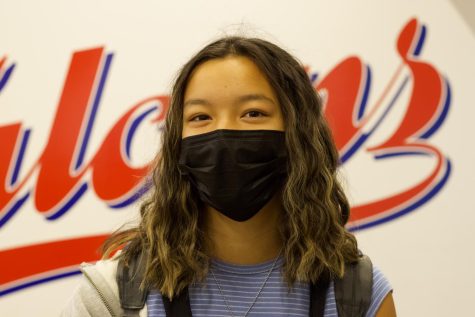
(Fia Cooper)
Sophomore Eva McCaffrey plays both soccer and basketball and has been diagnosed with one concussion. Though not sustained during games, it impacted her athletic season.
McCaffrey suffered a concussion last April “messing around with friends in the batting cages and got hit on the side of my head with a softball and my ear swelled up,” she said.
In the beginning, McCaffrey did not recognize the symptoms as a concussion. After diagnosis, she “did physical therapy for a month,” she said, as a part of her recovery.
McCaffrey was surprised at how long her recovery took, and it “was one of the worst things, because I could barely participate in school because screens hurt my head,” McCaffrey said. “It was really frustrating not being able to play and missing basketball tryouts,” she said.
After this experience, McCaffrey’s advice to others is to “listen when your parents and doctors say to rest and stay off screens as much as possible, it will definitely speed up the healing process,” she said.


